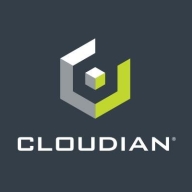


Cloudian HyperStore and Dell PowerScale are competitors in the cloud and data storage market. Cloudian stands out with flexible pricing and support, whereas Dell is favored for its comprehensive features.
Features: Cloudian HyperStore is known for its scalability, S3 compatibility, and cost efficiency. Dell PowerScale offers advanced data management, seamless IT integration, and supports unstructured data workloads effectively.
Room for Improvement: Cloudian could enhance its feature offerings and user interface. Dell PowerScale might benefit from simplifying deployment processes and addressing hardware cost challenges.
Ease of Deployment and Customer Service: Cloudian HyperStore is praised for its easy deployment and responsive customer service. Dell PowerScale requires a more complex setup but is supported by a robust customer service network to manage this complexity effectively.
Pricing and ROI: Cloudian HyperStore offers competitive pricing and appealing ROI, especially for smaller organizations. Dell PowerScale, despite higher initial costs, provides long-term ROI with its feature-rich offering, attracting larger enterprises.
It does not require much management once you set up correctly, so it saves time, allowing an admin to focus on other work.
In comparison to AWS, within fourteen months, the CAPEX investment pays off due to Cloudian's pricing model.
I have seen a pretty good ROI with Cloudian HyperStore in terms of reduced storage management overhead, lower cost per terabyte, and improved productivity across teams.
Despite being more expensive than Huawei, it is stable and most enterprises accept the price due to its stability.
In terms of Dell PowerScale (Isilon) specifically, we have seen a return on investment due to faster performance than our last few storage arrays, and the general usability is a lot better.
The second cluster of Dell PowerScale (Isilon) gives us flexibility for small things like code upgrades, all the way to scenarios where we have lost this data center or data, allowing us to check if data is still intact on the other side.
I would rate them an eight out of ten.
The support is done through email and is not that great, making it a very problematic area I've been dealing with for over four years.
Their technical support has been perfect lately, so I would give it a 10.
The support plus option provides a high level of assistance, including direct second-line support.
I would rate the customer support for Cloudian HyperStore a 10 out of 10 because they're great.
The quality of the technical support was good.
Support online is definitely a ten out of ten.
Dell provides support within four hours, and they always fulfill their promises.
They have managed previous issues well.
Pure Storage FlashBlade is scalable.
There are between 5 and 10,000 people using it in our organization.
Cloudian HyperStore's scalability has been awesome; it keeps up with our growing storage needs.
We started on PowerScale with around about 300 terabytes and are now two and a half petabytes, still on the same file system.
That's really saved us in certain areas as we didn't have funding to expand Dell PowerScale (Isilon) until next year, which is why we utilized the cloud pools functionality to offload.
Dell PowerScale is highly scalable, as evidenced by the reduced physical hardware and the efficient use of rack space.
In case there is any issue with any blade, the data is moved to another.
Since we have good protection levels, the data is secured and replicated across the disks.
I assess the stability and reliability of Dell PowerScale (Isilon) as perfect.
I find the product to be resilient and stable. There's no downtime and no crashes.
Technical support definitely needs significant improvement.
Its configuration should be easier.
One way Pure Storage FlashBlade can be improved is by having more compatibility between the FlashArray and FlashBlade.
Cloudian HyperStore is already very sophisticated, and no changes are needed as it is ahead of market need.
It has consistently met our expectations in terms of performance, scalability, and reliability.
It is important to thoroughly understand customer use cases to tailor the appropriate solution, whether using appliances for performance or software for backup targets.
Hardware failures under warranty should be addressed within the promised timeline.
I would want to see more AI features with Dell PowerScale (Isilon).
If I could improve one thing on Dell PowerScale (Isilon), it would be better object storage as it recently breached into S3, and that capability could be broadened.
The pricing of Pure Storage FlashBlade is expensive compared to other products I used from other companies in the past, but one benefit is that they have built-in ransomware protection.
Regarding pricing, it is okay; we needed exactly this in size, and the price was a lot lower than competitors, making it good for us.
Cloudian HyperStore offers reasonable pricing.
The pricing was competitive.
It's quite expensive for the amount of storage we have.
My experience with pricing, setup costs, and licensing for Dell PowerScale (Isilon) shows it's a premium platform, so it's a big amount of money.
The pricing is excellent.
We can plug in many blades, and we can have data up to one terabyte.
The best features of Pure Storage FlashBlade include better throughput and better performance.
Pure Storage FlashBlade's scalability is one of the most valuable features, and importantly, it always works, allowing for seamless upgrades.
Cloudian HyperStore positively impacts my organization by helping us centralize our data storage across our teams and simplify our infrastructure, meeting our growing demands on storage while maintaining performance and control.
One of the most significant features of Cloudian is its comprehensive RESTful API stack.
The most valuable aspects of Cloudian HyperStore include its ability to manage data individually, unlike traditional storage solutions.
Dell PowerScale offers high scalability and stability as well, making it a valuable solution for enterprises.
In our AI initiatives, Dell PowerScale (Isilon) plays a significant role in data analysis, data fusion; principally, it is involved in data analysis, data extraction, and statistical analysis.
Single files are limited to four terabytes in our configuration, however, the system can support up to 16 terabytes, so we can scale based on that too.
| Product | Market Share (%) |
|---|---|
| Dell PowerScale (Isilon) | 8.2% |
| Pure Storage FlashBlade | 5.6% |
| Cloudian HyperStore | 2.9% |
| Other | 83.3% |



| Company Size | Count |
|---|---|
| Small Business | 11 |
| Midsize Enterprise | 11 |
| Large Enterprise | 21 |
| Company Size | Count |
|---|---|
| Small Business | 3 |
| Midsize Enterprise | 1 |
| Large Enterprise | 4 |
| Company Size | Count |
|---|---|
| Small Business | 16 |
| Midsize Enterprise | 17 |
| Large Enterprise | 36 |
FlashBlade is the industry’s most advanced scale-out storage for unstructured data, powered by a modern, massively parallel architecture to consolidate complex data silos (like backup appliances and data lakes) and accelerate tomorrow’s discoveries and insights.
Cloudian HyperStore lets you start small and grow to hundreds of petabytes on-premises simply by adding nodes. Leverage the proven interoperability of the industry’s only 100% native S3 API.
Dell PowerScale leads in unstructured data management with unified file and object storage, massive scalability, security, and cloud adaptability, enhancing AI, analytics, and enterprise applications with exceptional performance and resilience.
Dell PowerScale Isilon provides a comprehensive platform for unstructured data, excelling in scalability, management, and performance. With features like single-pane management, SyncIQ, and SmartQuotas, it handles large datasets with flexibility and robust security. Its multi-protocol support and seamless expansion improve operational efficiency. While it offers strong data protection, enhancements in cloud integration, cybersecurity, and performance are sought. Users note potential for cost reductions and streamlined configurations and mention desired improvements in object storage handling and NFS support.
What are the key features of Dell PowerScale Isilon?Organizations across industries utilize Dell PowerScale Isilon for large-scale unstructured storage, supporting applications like video archiving, genomic data storage, and high-resolution imaging. Educational institutions, research centers, and media enterprises rely on its scaled-out storage capabilities, providing centralized, secure storage for diverse applications in hybrid, cloud, and on-prem environments.
We monitor all File and Object Storage reviews to prevent fraudulent reviews and keep review quality high. We do not post reviews by company employees or direct competitors. We validate each review for authenticity via cross-reference with LinkedIn, and personal follow-up with the reviewer when necessary.